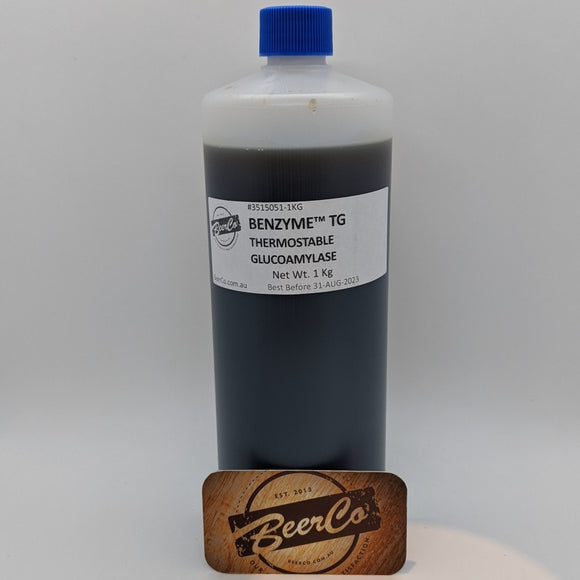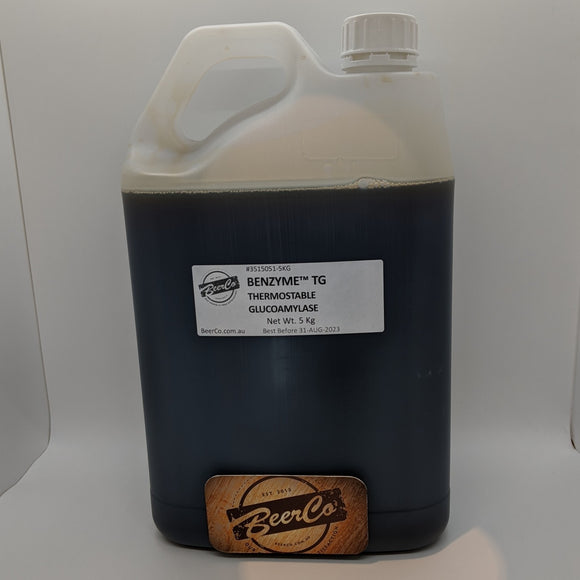Benzyme TG is a concentrated thermostable glucoamylase for cost-effective, consistent performance.
Benzyme TG is suitable if your distillery needs consistent performance and smooth operation at a low enzyme use cost.
Benzyme TG products maximize starch and dextrin conversion to sugars for yeast fermentation to ethanol.
In this product the key enzyme activity is provided by glucoamylase that hydrolyzes (1,4)- and (1,6)-alpha-D-glucosidic linkages at the non-reducing ends of polysaccharides.
Novozymes Saczyme® saccharification products | Distilling Application Sheet
Pack Sizes:
- 1 Kg Bottle
- 5 Kg Bottle (SAVE 20% OFF 1 Kg Bottle)
- 25 Kg Canister Novozymes Saczyme® Go 2X
Key Benefits:
High ethanol yields
This product maximizes starch and dextrin conversion to sugars for yeast fermentation to ethanol. The result is higher ethanol yields.
Fast fermentation rates
Faster ethanol production early in fermentation means you get more throughput from the same facility. It also helps reduce bacterial infection. That's because bacteria reproduce much more quickly than yeast and will consume sugar and reduce pH. By accelerating ethanol production, you can inhibit their reproduction.
Low residual starch & sugar levels
High levels of residual starch and sugars negatively impact your ethanol yields. This product reduces residual levels for higher ethanol yields.
Suited to no-jet-cooking processes
This product delivers aggressive hydrolysis and high viscosity reduction. That makes it suitable for operations that don't use jet cookers.
Hydrolyzes unconverted starch
Engineering design limitations or a coarse grind may make your liquefaction process sub-optimal. That can result in unconverted starch entering your saccharification / fermentation process. This product converts that starch during fermentation to boost your ethanol yields.
Effective on varying types and quality of raw materials
This product delivers reliable performance on a range of raw materials, regardless of their quality. These include corn, wheat, rye, rice and cassava.
Robust performance
This highly thermo-stable product delivers robust performance under varied conditions. That gives you more flexibility in your operating parameters.
How glucoamylases work in distilling saccharification
Glucoamylases hydrolyze (1,4)- and (1,6)-alpha-D-glucosidic linkages at the non-reducing ends of polysaccharides. That process yields glucose and maltose, which are suitable for fermentation by yeast.
Making beverage alcohol involves converting starch into fermentable sugars. Yeast then transforms these sugars into alcohol. Saccharification is the second enzymatic stage in the process, liquefaction being the first one. Saccharification breaks down the dextrins into simple sugars like glucose and maltose. The saccharification step is critical to the overall distiller's process. Effective saccharification ensures complete starch conversion to fermentable sugars.
In liquefaction, distillers break starch down into soluble short-chain dextrins. After leaving the cooking line, the heat exchangers cool the mash down. Then distillers add a glucoamylase.
During saccharification or simultaneous saccharification and fermentation (SSF) the glucoamylases target starch-containing substrates. They hydrolyze (1,4)- and (1,6)-alpha-D-glucosidic linkages at the non-reducing ends of polysaccharides. That breaks the dextrins down further, yielding glucose and maltose.
After saccharification, yeast converts glucose and maltose into alcohol during the fermentation process.
Estimated Dosage
Benzyme TG ……………………………………. 0.023-0.033%*
Typical dosing scenarios for Benzyme TG products. Optimal dosages must be determined under actual distillery operating conditions
* Dose on whole grain. Dose vary depending on grain, solid, fermentation time and equipment configuration
More specific dosage recommendations depending on grain type and conditions, can be obtained from our Customer Solutions Support. Please reach out to us at Service@BeerCo.com.au with any customer solutions inquiries.
Performance:
Benzyme TG glucoamylases are used on liquefied starch-containing substrates to produce sugars for fermentation. They work in dedicated saccharification stages as well as simultaneous saccharification and fermentation (SSF) operations. The glucoamylases hydrolyze both 1.4- and 1.6-alpha linkages to release glucose for subsequent fermentation by the yeast.
PRODUCT CHARACTERISTICS/PROPERTIES:
| Component name | Glucoamylase (glucan 1,4-alpha-glucosidase) |
| Activity | 1725 AGU/g |
| Colour |
Light to dark brown |
| Physical form | Liquid |
| Density | 1.13 g/ml |
Safety, handling and storage
Benzyme TG products should be stored at cool temperatures in closed containers protected from sun-light.
Recommended storage: 0-25 °C (32-77 °F)
Packaging must be kept intact, dry, and away from sunlight. Please follow the recommendations and use the product before the best-before date to avoid the need for a higher dosage.
Best before: You will find the best-before date in the certificate of analysis or on the product label. The product gives optimal performance when stored as recommended
and used prior to the best-before date.
The product can be transported at ambient temperature. Following delivery, the product should be stored as recommended.
Safety, handling and storage guidelines are provided with all products. Refer to Safety Data Sheet.


